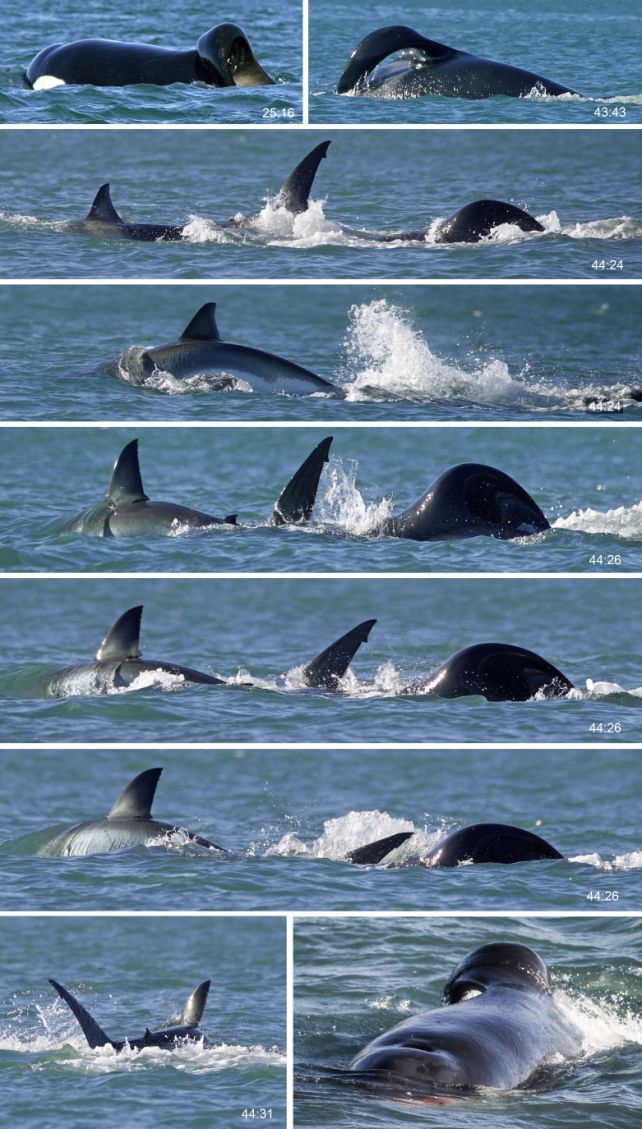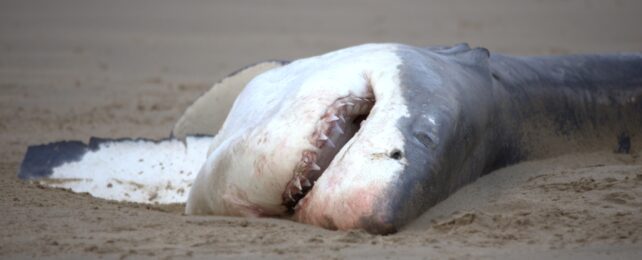Orca pack hunting is legendary. Working in tightly regimented groups, these fierce predators can bring down far more difficult prey than any one orca could handle alone.
But white sharks (Carcharodon carcharias), the terror of the seas? An orca (Orcinus orca) laughs at the white shark. In fact, scientists off the coast of South Africa have now observed that a single orca, acting alone, can dispatch a white shark extremely handily, triumphantly making off with its delicious, nutritious liver.
"As previously in South Africa, the orcas are exhibiting a strong preference for extracting and consuming the lipid-rich livers of white sharks – a specialized feeding behavior," says marine biologist Alison Towner of Rhodes University in South Africa.
"But what we witnessed was an orca, nicknamed Starboard – due to his collapsed dorsal fin – performing alone to incapacitate and consume a white shark within an astounding two-minute timeframe. Starboard was observed preying on a 2.5-meter (8.2-foot) juvenile white shark, later carrying the shark's liver in its mouth past a boat."
Orcas around the world focus their efforts on different kinds of prey, depending on what's available, but a few years ago, one particular prey species gave scientists a big surprise. For several years now, as seen in the 2022 video below, orcas have been documented killing white sharks off the South African coast, with extraordinary efficiency.
They're only interested in one thing, and they target that one thing with surgical precision. The livers of white sharks are huge and full of sustenance; the organ acts as a store for the fats and oils that sustain the sharks on their epic migratory journeys. Orcas have somehow figured this out, and are merrily feasting on the bounty.
Documented sightings of the hunt, however, are relatively rare; only a few groups of two or more orcas caught 'red-finned' in the act of shark marauding, and many sightings involve the same orcas. Since 2015, Starboard has been seen hunting sharks of various species with another male, nicknamed Port (because his dorsal fin is bent over to the left).
On 18 June 2023, sightings of Port and Starboard were reported off Mossel Bay, which is on the southern coast of South Africa. Researchers mobilized, setting off in a boat to see if they could observe the pair in action. They found them at Seal Island, a known orca hunting ground. But Port peeled off to the north of the island, while Starboard remained on the other side, to the south.

When a young white shark emerged near Starboard's location, the orca did not hesitate. He moved in for the kill. In under two minutes, the shark was eviscerated, and Starboard had secured his hepatic prize.
A second shark carcass, measuring 3.55 meters (11.6 feet) was found nearby; but, as that kill had not been observed, it's not known whether one or both of the orcas were responsible.
While it's both mesmerizing and amazing to discover the complex behavior of these impressive predators, scientists are concerned about the impact it is having on the local ecosystem. Sharks have been documented in fewer numbers since the orcas have started hunting them; that, in turn, means less elephant seal kills by the sharks.
It's not clear if this is going to have more serious impacts, such as increased food competition among the seals, which could affect younger, more vulnerable seals and produce population problems later down the line.
"Over two decades of annual visits to South Africa, I've observed the profound impact these killer whales have on the local white shark population. Seeing Starboard carry a white shark's liver past our vessel is unforgettable," says shark biologist Primo Micarelli of the University of Siena in Italy.
"Despite my awe for these predators, I'm increasingly concerned about the coastal marine ecology balance."
Orcas are highly intelligent, and very fast, social learners. If more of the animals move into the region, and they start being able to divide and conquer, their presence could hasten the ecological effects of their wanton feasting.
"The presence of these shark-hunting killer whales possibly ties into broader ecosystem dynamics," Towner says. "Rapid developments in this phenomenon make it challenging for science to keep pace, prompting us to publish these timely short communications."
The research has been published in the African Journal of Marine Science.
